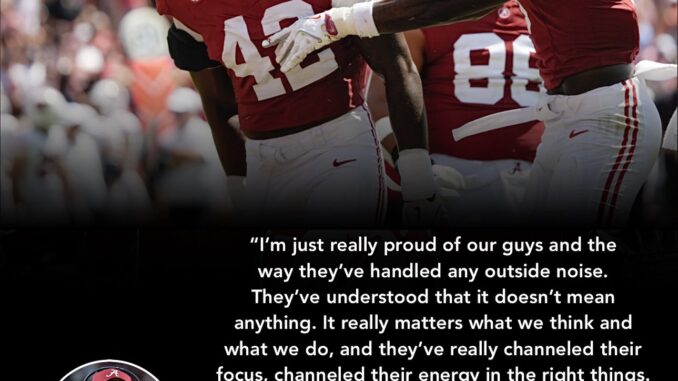
Kalen DeBoer Reflects on Alabama’s Growth After Florida State Loss
When Alabama hired Kalen DeBoer to succeed Nick Saban, the expectations were astronomical. The Crimson Tide fan base is accustomed to dominance, and every stumble is magnified under the microscope of college football’s most demanding program. So when Alabama suffered an early-season defeat to Florida State, the loss sent shockwaves through Tuscaloosa.
In hindsight, though, DeBoer views that moment as a crucial turning point. Speaking after a recent practice, the first-year Alabama head coach explained what the Florida State loss forced his team to do — and why it might be the most valuable lesson they could have learned.
Facing Reality in Tuscaloosa
“Losses are never easy here, especially at Alabama,” DeBoer admitted. “But that Florida State game made us look in the mirror. It showed us exactly where we weren’t good enough, and it forced us to confront things we might have otherwise ignored.”
The Seminoles exposed Alabama’s weaknesses in all three phases of the game. Defensively, the Tide struggled to contain explosive plays on the perimeter. Offensively, inconsistent quarterback play and protection issues kept them from finding a rhythm. On special teams, lapses in execution added to the frustration.
While the loss stung, DeBoer emphasized that it also eliminated any illusions the team might have had about relying solely on Alabama’s reputation to win games.
“Being Alabama gets you respect,” he said. “But it doesn’t win you games on Saturday. That night showed us we had to earn it, play by play.”
Forcing Accountability
According to players, the aftermath of the Florida State defeat was defined by accountability sessions unlike anything they had experienced before. Position groups dissected film with brutal honesty, and leaders emerged to set the tone.
“We had to stop pointing fingers and start pointing thumbs,” one veteran offensive lineman shared. “Coach DeBoer told us flat out: you can’t call yourself Alabama until you play like Alabama.”
DeBoer echoed that sentiment in his recent comments, explaining how the defeat forced the program to adopt a no-excuses mentality.
“You can’t hide behind tradition or past success,” DeBoer said. “You have to own your mistakes. That loss forced us to take ownership.”
Adjustments in Preparation
Another significant shift came in Alabama’s preparation methods. Players admitted they had approached early-season practices with a sense of complacency, assuming talent alone would carry them through.
The Florida State loss reset the standard. Practices became more intense, game plans more detailed, and competition for playing time more fierce. Younger players, in particular, began pushing veterans for snaps, creating an urgency that had been missing.
“Every rep mattered after that game,” DeBoer explained. “You could feel it. Nobody wanted to be the weak link anymore.”
Growth for the Quarterback Room
The quarterback position has been under the heaviest scrutiny in Tuscaloosa since the loss. With fans and analysts debating whether Alabama had a championship-caliber signal caller, the Florida State game magnified mistakes and forced the coaching staff to rethink its approach.
DeBoer, known as a quarterback developer during his time at Washington, said the setback gave him a teaching moment.
“That game showed our quarterbacks what it takes to operate at this level,” he said. “It’s not about one highlight throw; it’s about consistency, decision-making, and composure under pressure. They had to grow up fast.”
Reestablishing Alabama’s Identity
Perhaps the most significant outcome of the Florida State loss was Alabama’s renewed emphasis on identity. In recent years, debates have swirled around whether the Tide should lean into a more explosive, pass-heavy approach or return to their bruising, physical roots.
DeBoer said the defeat convinced him and his staff that the team needed balance — but also clarity.
“Alabama football has always been about toughness and execution,” he said. “We’re going to embrace physicality, but we’re also going to evolve with the game. That loss made us realize we can’t try to be something we’re not. We have to define who we are and commit to it.”
A Catalyst, Not a Curse
For Alabama fans, any loss can feel like a catastrophe. Yet DeBoer urged perspective, reminding supporters that setbacks are sometimes the foundation for growth.
“I know what losses mean here,” he acknowledged. “But if you handle them right, they can shape you in ways a win never could. Florida State might have beaten us, but that night also gave us the clarity we needed to move forward.”
Indeed, since that loss, Alabama has shown signs of improvement — tighter execution, better communication, and a visible sense of urgency. Whether those adjustments translate into another championship run remains to be seen, but the impact of that September night is undeniable.
Final Thoughts
For a first-year head coach, Kalen DeBoer has already experienced the highs and lows of life in Tuscaloosa. The Florida State loss was a bitter pill, but it also became a turning point. It forced Alabama to confront its flaws, embrace accountability, and reestablish an identity rooted in both tradition and evolution.
In DeBoer’s words, “Sometimes it takes a loss to remind you of what it really means to win.”
As Alabama continues its journey through the SEC gauntlet, that hard-earned lesson may prove invaluable. If the Crimson Tide does indeed return to the College Football Playoff, they may look back at the Florida State defeat not as a blemish, but as the spark that lit the fire.

Leave a Reply